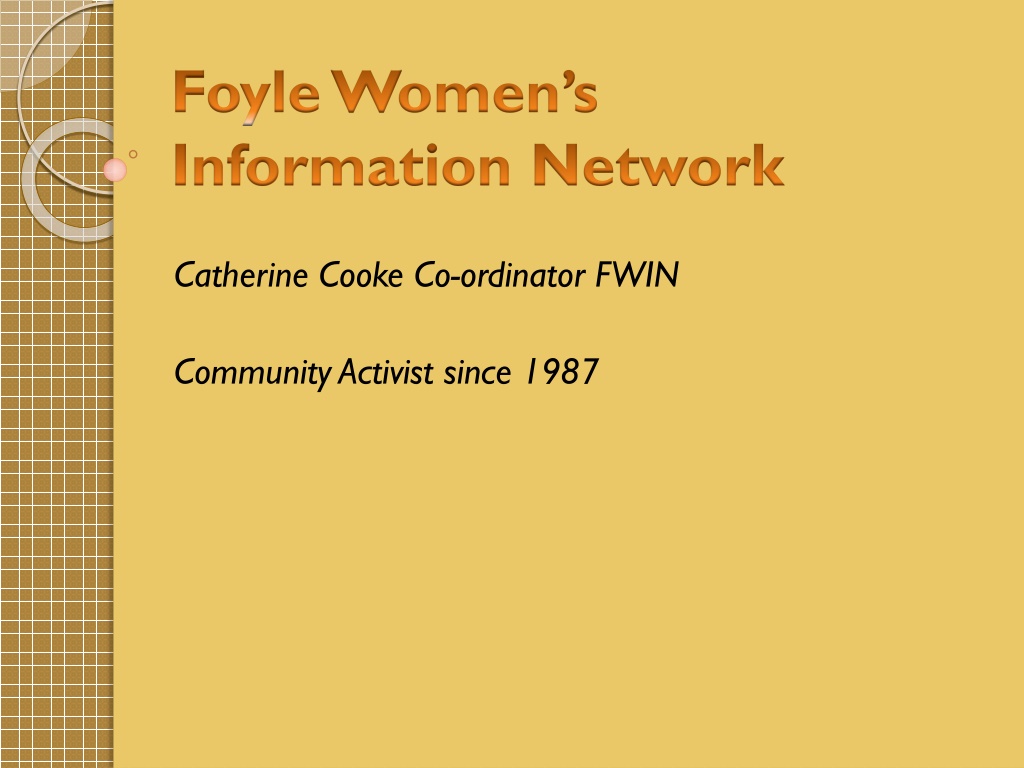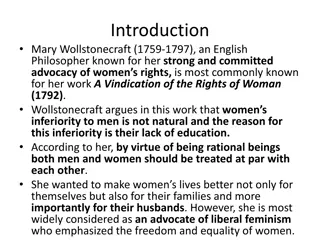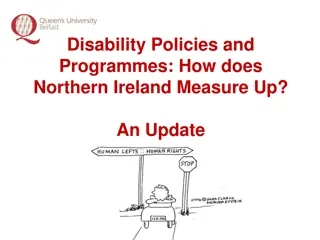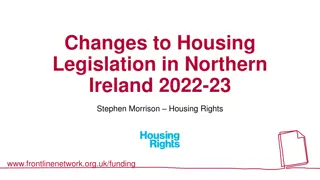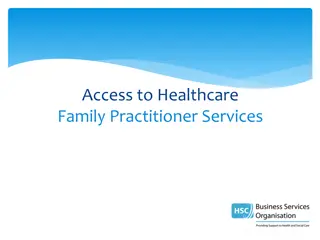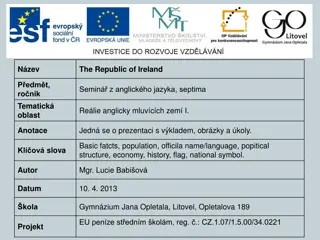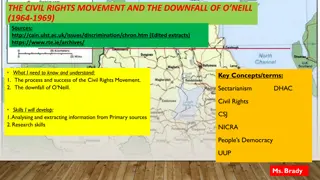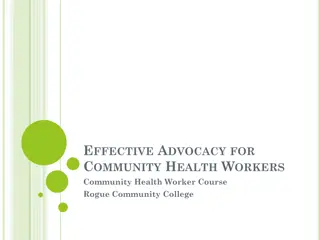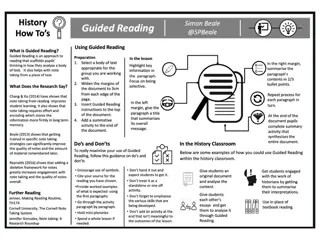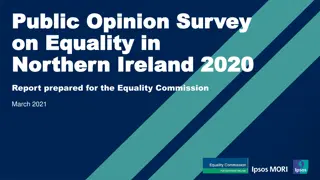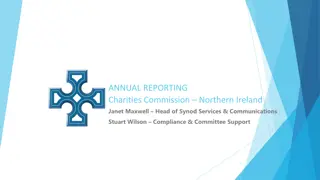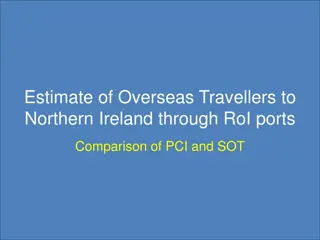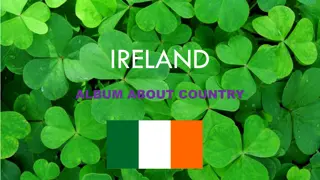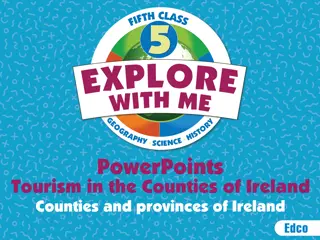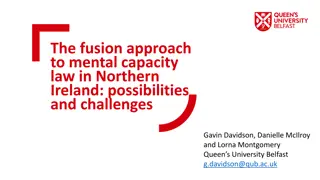Challenges and Progress: Women's Rights Advocacy in Northern Ireland
Addressing the state of gender equality in Northern Ireland, highlighting the struggles faced by women in various sectors, including politics. Key points include the lack of representation in government, slow progress towards gender equality, and historical milestones such as Margaret Thatcher's tenure as the UK's first and only female Prime Minister.
Download Presentation

Please find below an Image/Link to download the presentation.
The content on the website is provided AS IS for your information and personal use only. It may not be sold, licensed, or shared on other websites without obtaining consent from the author. Download presentation by click this link. If you encounter any issues during the download, it is possible that the publisher has removed the file from their server.
E N D
Presentation Transcript
Foyle Womens Information Network Catherine Cooke Co-ordinator FWIN Community Activist since 1987
The State of the Women s Sector GFA Women s Coalition Lack of Equality Where are the Women? Quotas or not? Issues we are left with!
Where are the Women? The population of Northern Ireland is 1.8 million out of this population it is estimated that 49% are male and 51% female
Women in Politics National Government Stormont Assembly 18% Women Men 72%
Current Progress At the current rate of progress, gender equality of MLAs at Stormont will only take another 16 cycles = 65 years
MEPs European Northern Ireland 31% 33% Female Female Male Male 67% 69%
Female Prime Minister In the history of the UK politics there has only ever been one female Prime Minister Margaret Thatcher. She was one of the longest serving Prime Ministers for 150 years holding office from 4thMay 1979 until 28thNovember 1990. It is undeniable that she made a huge influence on the economy and in UK politics
Margaret Thatcher Quote: Any woman who understands the problems of running a home will be nearer to understanding the problems of running a country. Margaret Thatcher former Prime Minister UK
Houses of Parliament Nearly 25% of MP s in the House of Commons are female In the House of Lords only one fifth of the total members are female 100 years ago there were NO women
Speaker of the House The statistics for Speaker of the House of Commons is also astonishing in terms of gender equality to women in politics. Only one woman in history has ever played the role. Betty Boothroyd was the first and only female speaker of the House being elected as Speaker in 1992.
Women in Local Government Councils 24% Women 76% Men
Current Progress Women representatives in local council are slightly higher than the national government however once again it would take thirteen elections, spanning 52 years to reach gender balance in councils
A society that is without the voice and vision of women is not less feminine, it is less human . Words from: Mary Robinson former President of Ireland and UN High Commissioner for Human Right
Quotas FOR OR AGAINST THAT IS THE QUESTION? Is it about the best person for the job? Does it undermine women? Does it make them feel like token s unequal Is it a necessary evil?
Pros for Quotas: + 1. Quotas are the quickest and most effective way to ensure more equal numbers of men and women on boards. 2. Quotas force the break up of elite circles that might otherwise remain unchallenged. 3. If women are promoted into positions of power, they can act as positive role models for others. 4. Once on the board, women are more likely to hire more women. 5. Quotas are not discriminatory, they simply correct existing discrimination.
Cons for Quotas: - 1. Quotas discriminate against the individual men who happen to be running against a woman for a seat. 2. If women are engaged through quotas, they will be seen as "token", will be less respected and will have less power. 3. Quotas set women against each other, competing for a certain number of "women's seats", which might destroy co-operation and unity. 4. Instating a quota might lend to view them as a ceiling rather than a floor on the number of women, stalling progress on equality in the long run.
What has to happen? Community Programmes
Women into Public Life Project The project aims to address the continuing under representation of women in decision making roles and influence the development of policies to address the issue. HOW? Training Grassroots and Strategic Leadership Advocacy Mentoring and Shadowing Campaigning
Women into Politics This regional organisation was set up in order to target gender equality and help to push for more women into politics and roles which are normally filled by the majority of males Women s participation in politics Women s participation in elections Violence against women Equal opportunities for women Equal pay grades for women
Context: What does the future hold? Northern Ireland The conflict in Northern Ireland lasted between 1969 and 1994. Peace Making and Community Development.
Issues Childcare Domestic Violence Resources Exclusion Reproductive rights Continuing Polarisation Segregated Education Systems The lack of women in Public Life for shaping the future
FINAL THOUGHT Do not follow where the path may lead. Go instead where there is no path and leave a trail Ralph Waldo Emerson
Thank You Catherine Cooke Foyle Women s Information Network 12-14 The Diamond Derry/ Londonderry BT48 6HW www.fwin.org.uk catherine@fwin.org.uk
